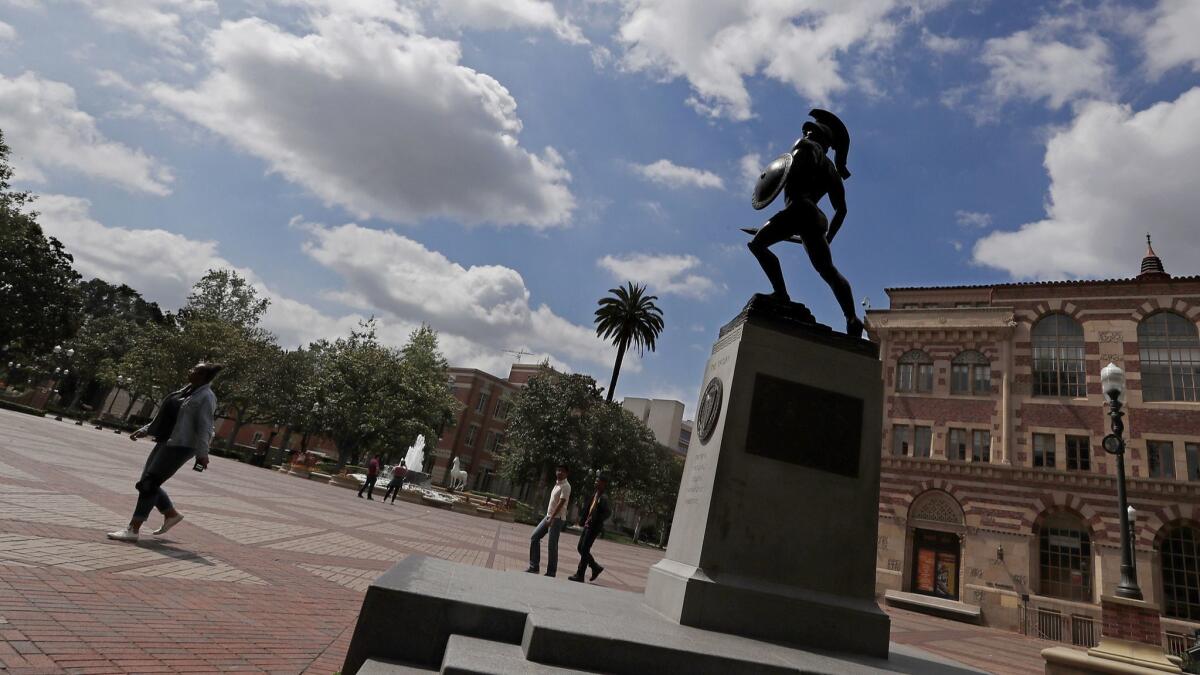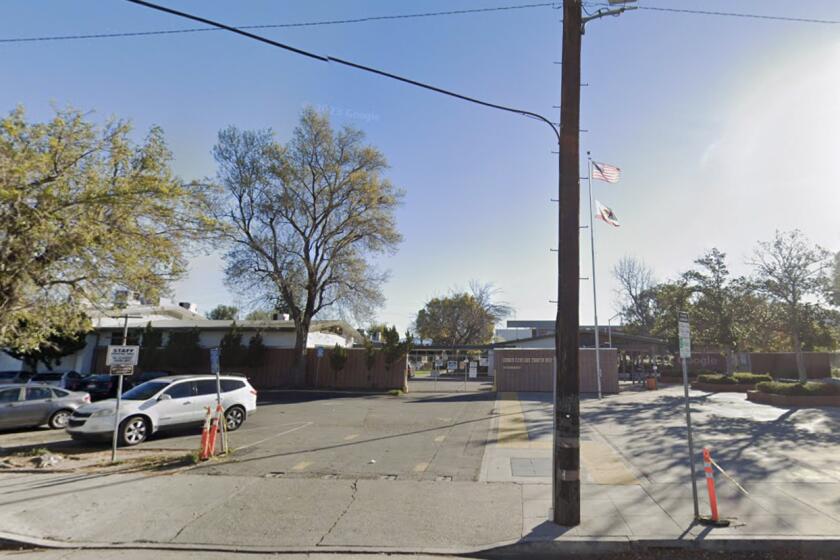With Nikias stepping down, USC students and faculty say they want more transparent, ethical leadership

When Vanessa Schwartz learned on Friday that USC President C.L. Max Nikias would be stepping down, she took a long, deep breath. Elation washed over her.
In the days since The Times published an investigation about Dr. George Tyndall, the longtime campus gynecologist who faced repeated complaints of misconduct, Schwartz has been busy demanding action.
Schwartz, a professor of art history and history, is on leave for a fellowship but came back to campus last week to protest the university’s leadership. She signed her name to a letter demanding Nikias’ resignation. She spoke out at a heated forum on Wednesday.
“Sometimes a lifetime can happen in the course of a few days,” said Schwartz, who has taught at USC for 18 years.
“I am totally optimistic, or I would not have participated in any of this. We participated because we believe in the future of this university. We care deeply about it and our students. This is not about seeking retribution or punishment.”
The announcement of Nikias’ departure capped days of turmoil at USC that, on Saturday, gave way to discussions about how the university will move forward. It’s unclear when exactly Nikias will step down as president and how quickly the Board of Trustees plans to name a replacement.
Nikias oversaw dramatic growth at USC but also a series of scandals that eroded confidence in him among some on campus.
USC faculty and students said Saturday that the university needs more transparency, communication and ethical leadership from both the administration and the Board of Trustees if it wants to move forward from a string of damaging scandals. Many hoped Nikias’ departure would be the start of a new era.
“Our community is in pain, and we welcome a transition that can begin the process of healing,” professor Paul Rosenbloom, president of the Academic Senate, wrote in a letter to faculty members Friday evening. The Academic Senate last week passed a resignation calling for Nikias’ resignation.
“The Senate recognized that throughout the past year there has been an increasing breakdown of trust between the President and the academic community,” Rosenbloom continued. “Our conclusion … was that this break in trust was irreparable, and that the only way forward for the university was a change in the presidency.”
More than 300 people have come forward to USC, many with allegations of mistreatment and sexual abuse that dates back to the early 1990s.
The Times reported that Tyndall was the subject of repeated complaints from staff and patients about inappropriate comments and touching. The university barred him from treating patients only after a nurse, frustrated that her complaints had been ignored, reported Tyndall to the campus rape crisis center. An internal investigation concluded that Tyndall had sexually harassed students and performed pelvic exams that departed from current medical standards.
Yet administrators and USC’s general counsel struck a secret deal with Tyndall, allowing him to resign with a financial payout. USC opted not to report Tyndall to the Medical Board of California when he resigned, nor were patients notified of the allegations against him. The university insisted it was under no legal obligation to report Tyndall to the Medical Board, but later acknowledged that, “in hindsight,” it should have. Administrators filed a belated complaint in March.
The Los Angeles Police Department is now investigating, and USC already is beginning to face what is expected to be costly litigation by women who say Tyndall, 71, abused them.
The revelations about Tyndall came less than a year after Times disclosures about drug and alcohol abuse by Dr. Carmen A. Puliafito during his tenure as dean of the university’s medical school, a period when he was also partying with young criminals and addicts. Puliafito’s replacement as dean, Rohit Varma, resigned as The Times was about to publish a report on allegations he sexually harassed a colleague, whom the university paid $135,000 as a result of her complaint.
Tara McPherson, a professor in the School of Cinematic Arts, said that some of the hundreds of faculty members who signed the letter demanding Nikias’ resignation have been excitedly emailing each other since the news broke.
“People are pretty ecstatic,” she said. “There were a lot of feelings over the past few years that the university had lost its way.”
McPherson said the move “allows us to move forward, to address the needs of the women affected and to rebuild trust with the students.”
Schwartz, the art history professor who has been teaching at USC for 18 years, said, “there’s been a failure of moral and ethical leadership, period.”
Schwartz said Nikias failed to accept responsibility for the scandals and that she “lost it” after learning the president attended and spoke at a catered reception in honor of Puliafito after he announced his resignation.
“I’m sure Max expects a party, too,” she said.
Schwartz said she has found Nikias’ communications with the campus community in the wake of the Tyndall revelations insincere.
“Is there a real person there, or is it just one dictated memo by a very bad team of spin doctors and lawyers?”
Walking through the USC campus Saturday, Alissa Brasington, a 19-year-old animation student, said she hopes the scandals will make university leaders more willing to act upon reports of misconduct and wrongdoing. She called Nikias’ departure “a big deal.”
“Change is actually happening, and this is the first time in a while that anyone has taken responsibility for something like this.”
Umit Bas, a 30-year-old electrical engineering doctoral candidate, said USC should have been open about Tyndall and that the scandals are “hurtful” for the university’s reputation.
“For some people, USC failed to create a safe environment,” Bas said.
Katie Usellis, a 20-year-old student studying global health, said she hopes USC considers student input as it chooses its next president.
“I’d love to see a female president for the school,” Usellis said. “Especially since this is kind of like a women’s rights issue that took such a long time to actually do something. … I feel like a woman president would not prioritize the [school’s reputation] as much but take a stand on a strong moral ground.”
She said it doesn’t feel like students have any say in what happens on campus and that USC needs to be more transparent about allegations involving staff and faculty.
“It’s our school,” she said. “We pay to be here. We trust it to be a safe place. We trust it to be a place that we can learn, but we don’t really hear much about what’s going on until it’s already happened.”
Several students said they were surprised by Nikias’ decision to go, thinking he would be able to weather another calamity since so many had happened in quick succession.
“I thought he would stick it through,” theater student Vicente Saintignon said.
Nikias presided over the development of the $700-million USC Village, and his name is on several buidlings in the red-brick housing and retail complex. As a recent graduate, who gave only his first name, Alex, walked through the courtyard on Saturday, he described Nikias’ tenure as a double-edged sword because the president was a prolific fundraiser who also boosted the university’s reputation by luring top professors.
“He did a lot of good for the school, but he also pushed a lot under the rug,” Alex said.
When it comes to Nikias, he said, “everyone is going to see the Village, but they are also going to remember the gynecologist.”
Twitter: @haileybranson
More to Read
Start your day right
Sign up for Essential California for news, features and recommendations from the L.A. Times and beyond in your inbox six days a week.
You may occasionally receive promotional content from the Los Angeles Times.









